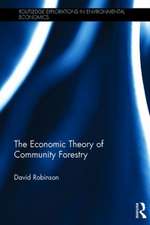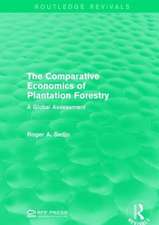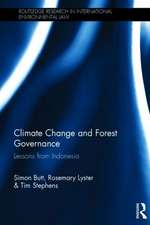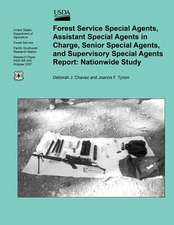Illegal Logging in the Tropics: Strategies for Cutting Crime
Autor Ramsay M Ravenel, Ilmi M E Granoff, Carrie A Mageeen Limba Engleză Paperback – 18 ian 2005
In March 2002, the Yale chapter of the International Society of Tropical Foresters brought together social and natural scientists, resource managers, policymakers, community leaders, and other interested parties to share experiences, strategies, successes, and failures in addressing illegal logging and corruption. The results were the conference Illegal Logging in Tropical Forests: Ecology, Economics, and Politics of Resource Misuse and this book, which brings together analyses from the perspectives, of anthropology, economics, forestry, law, political science, and sociology.
Illegal Logging in the Tropics: Strategies for Cutting Crime suggests specific policy interventions aimed at curbing illegal logging and identifying solutions to forest crime. It presents both thematic analyses of illegal logging at the global level and case studies on both the local and national levels in African, Latin American, and Asian countries. The contributors draw on their experiences in Benin, Brazil, Cameroon, India, Indonesia, Mexico, and Vietnam.
Illegal Logging in the Tropics: Strategies for Cutting Crime examines:
- global governance—with a cross-country regression analysis of deforestation and various aspects of governance
- global forest trade—with extensive reviews of data on global trade in forest products
- community perspectives on illegal logging—including a system dynamics model of villagers’ willingness to log, a description of community involvement in broader networks of illegal trade, and a chapter that challenges the credibility of illegality as defined by a corrupt government or agency
- the efforts of NGOs to combat illegal logging
- how illegal logging is typically symptomatic of broader failures of governance
- the role of monitoring in cutting forest crime
- whether illegal logging is better combated via law enforcement or by local communities—with pros and cons for each approach
- the proximate causes of illegal logging, including access to forests and equipment, and economic factors
- the efforts of Transparency International—a widely lauded organization combating corruption—to address illegal logging at the international policy level
Preț: 327.54 lei
Preț vechi: 418.85 lei
-22% Nou
62.68€ • 65.60$ • 52.17£
Carte tipărită la comandă
Livrare economică 31 martie-14 aprilie
Specificații
ISBN-10: 1560221178
Pagini: 408
Dimensiuni: 152 x 229 x 25 mm
Greutate: 0.64 kg
Ediția:1
Editura: CRC Press
Colecția CRC Press
Public țintă
ProfessionalCuprins
- Preface (Francis E. Putz)
- Acknowledgments
- INTRODUCTION
- Introduction to Illegal Logging in the Tropics (Ramsay M. Ravenel and Ilmi M. E. Granoff)
- PROBLEM DESCRIPTION
- Undercutting Sustainability: The Global Problem of Illegal Logging and Trade (Wynet Smith)
- THEORETICAL APPROACHES TO UNDERSTANDING FOREST GOVERNANCE
- A System Dynamics Examination of the Willingness of Villagers to Engage in Illegal Logging (Richard G. Dudley)
- Does Improved Governance Contribute To Sustainable Forest Management? (Nalin Kishor and Arati Belle)
- Illegal Logging and Local Democracy: Between Communitarianism and Legal Fetishism (Antonio Azuela)
- You Say Illegal, I Say Legal: The Relationship Between ’Illegal’ Logging and Land Tenure, Poverty, and Forest Use Rights in Vietnam (Pamela McElwee)
- Can ’Legalization’ of Illegal Forest Activities Reduce Illegal Logging? Lessons from East Kalimantan (Luca Tacconi, Krystof Obidzinski, Joyotee Smith, Subarudi, and Iman Suramenggala)
- CASE STUDIES
- Social and Environmental Costs of Illegal Logging in a Forest Management Unit in Eastern Cameroon (Philippe Auzel, Fousseni Feteke, Timothée Fomete, Samuel Nguiffo, and Robinson Djeukam)
- Recent Trends in Illegal Logging and a Brief Discussion of Their Causes: A Case Study from Gunung Palung National Park, Indonesia (Marc A. Hiller, Benjamin C. Jarvis, Hikma Lisa, Laura J. Paulson, Edward H. B. Pollard, and Scott A. Stanley)
- Community-Based Logging and De Facto Decentralization: Illegal Logging in the Gunung Palung Area of West Kalimantan, Indonesia (Ramsay M. Ravenel)
- Combating Corruption and Illegal Logging in Bénin, West Africa: Recommendations for Forest Sector Reform (Ute Siebert and Georg Elwert)
- INTERVENTIONS: THEORY AND PRACTICE
- Illegal Actions and the Forest Sector: A Legal Perspective (Kenneth L. Rosenbaum)
- The Role of Monitoring in Cutting Crime (Wynet Smith)
- Illegal Logging and Deforestation in Andaman and Nicobar Islands, India: The Story of Little Andaman Island (Pankaj Sekhsaria)
- Combating Forest Corruption: The Forest Integrity Network (Aarti Gupta and Ute Siebert)
- SYNTHESIS
- Illegal Logging in the Tropics: A Synthesis of the Issues (Ramsay M. Ravenel and Ilmi M. E. Granoff)
- Index
- Reference Notes Included
Notă biografică
Descriere
Examine why illegal logging is so pervasive—and how this problem can be addressed
In March 2002, the Yale chapter of the International Society of Tropical Foresters brought together social and natural scientists, resource managers, policymakers, community leaders, and other interested parties to share experiences, strategies, successes, and failures in addressing illegal logging and corruption. The results were the conference Illegal Logging in Tropical Forests: Ecology, Economics, and Politics of Resource Misuse and this book, which brings together analyses from the perspectives, of anthropology, economics, forestry, law, political science, and sociology.
Illegal Logging in the Tropics: Strategies for Cutting Crime suggests specific policy interventions aimed at curbing illegal logging and identifying solutions to forest crime. It presents both thematic analyses of illegal logging at the global level and case studies on both the local and national levels in African, Latin American, and Asian countries. The contributors draw on their experiences in Benin, Brazil, Cameroon, India, Indonesia, Mexico, and Vietnam.
Illegal Logging in the Tropics: Strategies for Cutting Crime examines:
- global governance—with a cross-country regression analysis of deforestation and various aspects of governance
- global forest trade—with extensive reviews of data on global trade in forest products
- community perspectives on illegal logging—including a system dynamics model of villagers’ willingness to log, a description of community involvement in broader networks of illegal trade, and a chapter that challenges the credibility of illegality as defined by a corrupt government or agency
- the efforts of NGOs to combat illegal logging
- how illegal logging is typically symptomatic of broader failures of governance
Specific chapters in Illegal Logging in the Tropics: Strategies for Cutting Crime investigate:
- the role of monitoring in cutting forest crime
- whether illegal logging is better combated via law enforcement or by local communities—with pros and cons for each approach
- the proximate causes of illegal logging, including access to forests and equipment, and economic factors
- the efforts of Transparency International—a widely lauded organization combating corruption—to address illegal logging at the international policy level
In addition, this valuable resource provides you with an essential overview of the literature on illegal logging, an in-depth analysis of the incentive structures that bring local residents to commit forest crimes, and a great deal more. Let Illegal Logging in the Tropics: Strategies for Cutting Crime be your guide to the intricacies of this increasingly urgent issue.














